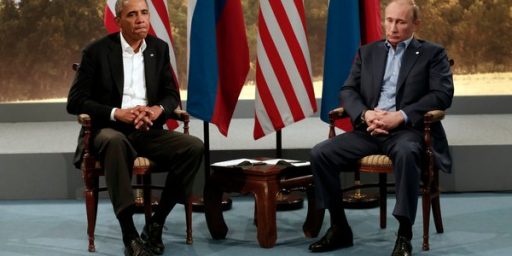Public Remains Opposed To Syria Strikes
As we head into a week or more of Congressional debate, the American public remains heavily opposed to American military action against Syria:
President Obama faces an uphill battle in making the case for U.S. military action in Syria. By a 48% to 29% margin, more Americans oppose than support conducting military airstrikes against Syria in response to reports that the Syrian government used chemical weapons.
The new national survey by the Pew Research Center, conducted Aug. 29-Sept. 1 among 1,000 adults, finds that Obama has significant ground to make up in his own party. Just 29% of Democrats favor conducting airstrikes against Syria while 48% are opposed. Opinion among independents is similar (29% favor, 50% oppose). Republicans are more divided, with 35% favoring airstrikes and 40% opposed.
(…)
Three-quarters (74%) believe that U.S. airstrikes in Syria are likely to create a backlash against the United States and its allies in the region and 61% think it would be likely to lead to a long-term U.S. military commitment there. Meanwhile, just 33% believe airstrikes are likely to be effective in discouraging the use of chemical weapons; roughly half (51%) think they are not likely to achieve this goal.
However, most believe Assad is guilty of using chemical weapons; 53% say there is clear evidence that the Syrian government used them against civilians there while just 23% say there is no clear evidence of a chemical attack. While those who think the evidence is clear offer modestly more support for airstrikes, even here as many oppose as support U.S. military involvement (41% each).
I’m sure we’ll see more polls on this issue as the next week to ten days unfolds and they’re likely to be consistent with this result. The question is what impact public opinion will have on how Congress votes. As we’ve learned in the past (see e.g., the 2008 vote on TARP and the 2010 vote on the PPACA), sustained public opposition to a course of action desired by the President and the powers-that-be in Congress does not mean that Congress will follow public opinion.
Update: The Pew results are mirrored in a new poll from ABC News and The Washington Post:
Americans widely oppose launching missile strikes against the Syrian government for its alleged use of chemical weapons, according to a new Washington Post-ABC News poll that finds little appetite for military action across the country despite a growing drumbeat in Washington.
Nearly six in 10 oppose missile strikes in light of the U.S. government’s determination that Syria used chemical weapons against its own people. Democrats and Republicans alike oppose strikes by double digit margins, and there is deep opposition among every political and demographic group in the survey. Political independents are among the most clearly opposed, with 66 percent saying they are against military action.
Broad opposition in the new poll contrasts with a December Post-ABC poll that found most Americans saying they would be supportive of U.S. action if Syria used chemical weapons. At that time, 63 percent supported U.S. military involvement when it was a hypothetical situation, while 30 percent were opposed.
Such possible support for action has yet to materialize in the weeks after an August 21 gassing that reportedly killed 1,429 people outside of Damascus. The survey was conducted Wednesday through Sunday, as the Obama administration made its public case for military strikes and presented intelligence claiming “high certainty” that Syria’s government is the culprit in attacks.
Americans express more support for action if Britain and France were to join the cause, a prospect that became far less likely after the British parliament shot down a proposal for military action in Syria. In the United States, support for missile strikes in Syria rises by 10 percentage points, to 46 percent, if Britain and France participate, including a 14 point jump among independents. Still, 51 percent remain opposed even if such a coalition materialized.
It will be interesting to see how these numbers move, if at all, as the Administration and its supporters in Congress attempt to make their case over the coming week.






Shockingly enough, getting involved in another middle eastern war is unpopular. Whocouldathunkit?
Let’s start writing letters to our congresscritters, guys….who knows, they might change their minds.
@grumpy realist: On Friday, I called my Congressman (Bill Young R) and both Senators. Told the office worker/voicemail listener in my best cranky-old-man voice that I opposed bombing Syria and supported requiring the President to come to Congress for the authorization. The two human beings I spoke to seemed completely UNsurprised and indicated they’d been hearing lots of similar messages from us out in the great unwashed.
Well I sent an e-mail to my Senator (Levin). I expect nothing but a jolly reply in a few months that says, “thanks for writing, but I voted different because clearly I know the issues better.”
Ignore your constituents at your peril. there may well be a wave election on 2014 after all.
Assad has figured out our strategy already.
@Donald Sensing:
Please don’t think nobody notices that you blogwhore many posts on a variety of blogs.
Let’s stay out of this and concentrate on putting our own house in order. God knows it needs it.
I’m almost ambivalent about limited military action against Syria. I’m not sure what it’s going to accomplish, and I really hope it doesn’t lead to us become even further embroiled. I’m not really opposed to a strike though, as I understand the reasoning behind our desire to do “something”.
That said, I am a bit conflicted …
In all honesty, If this was a President Mitt Romney or John McCain trying to make the same argument, I’d probably be a bit more likely to lean towards my more natural anti-war inclinations.
… and if we were talking about attacking Iran instead of Syria, I’d be vocally opposed no matter who the President is.
Watching the exchange today between Rand Paul and John Kerry, on a visceral level my own views are probably closer to Paul’s … I just wish he didn’t have to be such a smug dick about it.
Why is it the media and our elected officals keep speaking around the elephant in the room.
The two largest recipiants of US military aid in the region have not signed in on the chemical weapons ban treaty. Israel and Egypt. What kind of moral high ground is this.
Congress and the House are tooooo stupid to say no. We are not saving face.
Let all these other countries take the leak.
Does the president ever listen to what the people say?
http://www.theonion.com/articles/poll-majority-of-americans-approve-of-sending-cong,33752/